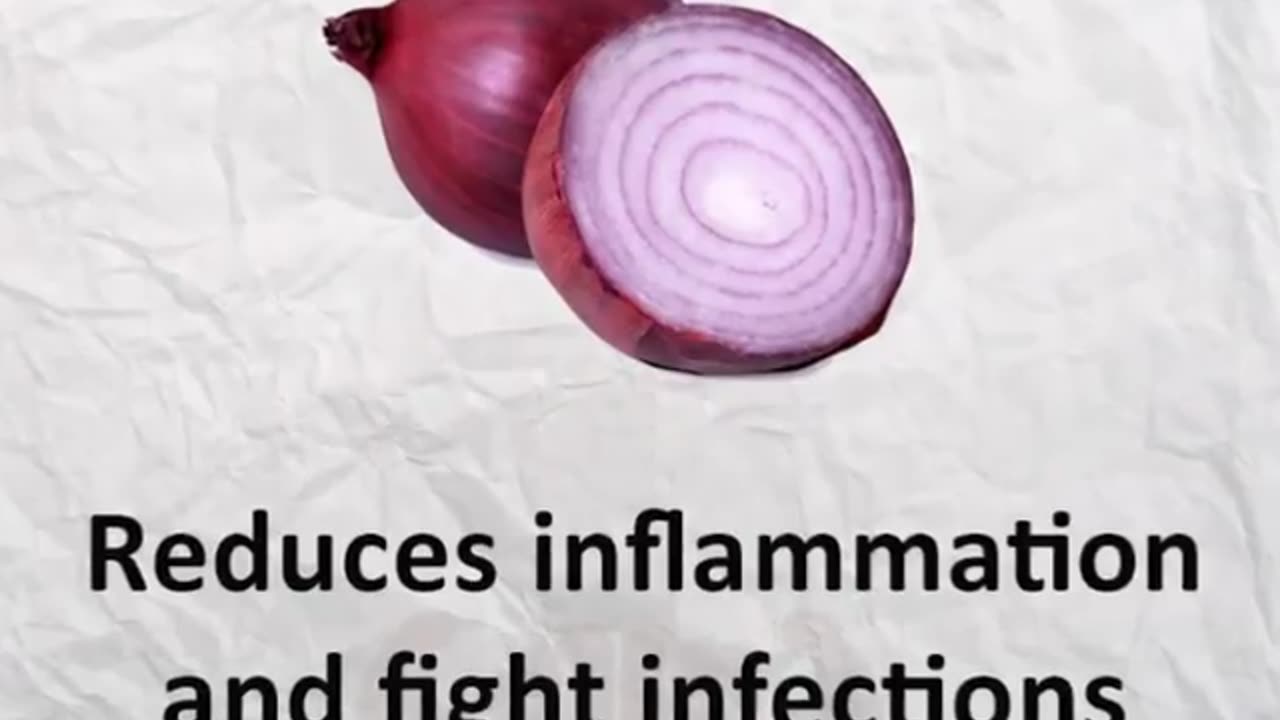Premium Only Content

Amazing Health Benefits of Red Onions !
Onions contain many antioxidants and sulfur-containing compounds. They have been linked to a reduced risk of cancer, lower blood sugar levels, and improved bone health.
Onions (Allium cepa) are bulb-shaped vegetables that grow underground.
Also known as bulb onions or common onions, they are grown worldwide and are closely related to chives, garlic, scallions, shallots, and leeks.
Commonly used as a flavoring or side dish, onions are a staple food in many cuisines. They can be baked, boiled, grilled, fried, roasted, sautéed, powdered, or eaten raw.
Onions vary in size, shape, and color, but the most common types are white, yellow, and red. The taste ranges from mild and sweet to sharp and spicy, depending on the variety and season.
Onions can also be consumed when immature before the bulb reaches full size. They are then called scallions, spring onions, or summer onions.
This article tells you everything you need to know about onions, including their potential health benefits.
Nutrition facts
Raw onions are very low in calories, with only 40 calories per 3.5 ounces (100 grams).
By fresh weight, they are 89% water, 9% carbs, and 1.7% fiber, with tiny amounts of protein and fat.
The main nutrients in 3.5 ounces (100 grams) of raw onions are (1Trusted Source):
Calories: 40
Water: 89%
Protein: 1.1 grams
Carbs: 9.3 grams
Sugar: 4.2 grams
Fiber: 1.7 grams
Fat: 0.1 grams
Carbs
Carbohydrates make up about 9–10% of both raw and cooked onions.
They consist mostly of simple sugars, such as glucose, fructose, and sucrose, as well as fiber.
A 3.5-ounce (100-gram) portion contains 9.3 grams of carbs and 1.7 grams of fiber, so the total digestible carb content is 7.6 grams.
Fibers
Onions are a decent source of fiber, which accounts for 0.9–2.6% of the fresh weight, depending on the type of onion.
They are very rich in healthy soluble fibers called fructans. In fact, onions are among the main dietary sources of fructans (2Trusted Source, 3).
Fructans are so-called prebiotic fibers, which feed the beneficial bacteria in your gut.
This leads to the formation of short-chain fatty acids (SCFAs), such as butyrate, which may improve colon health, reduce inflammation, and cut your risk of colon cancer (4Trusted Source, 5Trusted Source, 6Trusted Source).
However, fructans are considered FODMAPs, which may cause unpleasant digestive symptoms in sensitive individuals, such as those with irritable bowel syndrome (IBS) (7Trusted Source, 8Trusted Source, 9Trusted Source).
SUMMARY
Onions consist mostly of water, carbs, and fiber. Their main fibers, fructans, can feed the friendly bacteria in your gut, though they may cause digestive problems in some people.
Vitamins and minerals
Onions contain decent amounts of several vitamins and minerals, including:
Vitamin C. An antioxidant, this vitamin is needed for immune function and maintenance of skin and hair (10Trusted Source, 11Trusted Source, 12Trusted Source).
Folate (B9). A water-soluble B vitamin, folate is essential for cell growth and metabolism and especially important for pregnant women (13Trusted Source).
Vitamin B6. Found in most foods, this vitamin is involved in the formation of red blood cells.
Potassium. This essential mineral can have blood pressure-lowering effects and is important for heart health (14Trusted Source, 15Trusted Source).
Other plant compounds
The health benefits of onions are attributed to their antioxidants and sulfur-containing compounds (3).
In many countries, onions are also among the main dietary sources of flavonoids, specifically a compound called quercetin (16Trusted Source, 17Trusted Source, 18Trusted Source).
The most abundant plant compounds in onions are:
Anthocyanins. Only found in red or purple onions, anthocyanins are powerful antioxidants and pigments that give these onions their reddish color.
Quercetin. An antioxidant flavonoid, quercetin may lower blood pressure and improve heart health (19Trusted Source, 20Trusted Source).
Sulfur compounds. These are mainly sulfides and polysulfides, which may protect against cancer (21Trusted Source, 22Trusted Source, 23Trusted Source).
Thiosulfinates. These sulfur-containing compounds may inhibit the growth of harmful microorganisms and prevent the formation of blood clots (24Trusted Source).
Red and yellow onions are richer in antioxidants than other types. In fact, yellow onions may contain almost 11 times more antioxidants than white onions (25Trusted Source).
Cooking can significantly reduce levels of some antioxidants (26Trusted Source).
-
 1:38:47
1:38:47
Badlands Media
1 day agoDevolution Power Hour Ep. 387: Trump, Epstein, Durham Mysteries, and North Korea Ops
98.9K25 -
 1:05:23
1:05:23
Man in America
17 hours agoSoaring Gold Exposes the Imminent Crash of the Old System w/ John Perez
56.3K9 -
 2:42:40
2:42:40
TruthStream with Joe and Scott
18 hours agoTHOMAS AND GROK: AI, Bible decodes, The JESUS Cube live 9/6 #487
44.7K10 -
 2:34:46
2:34:46
BlackDiamondGunsandGear
12 hours agoGet Prepped / After Hours Armory / LIVE SHOW /
29.5K1 -
 2:01:39
2:01:39
Tundra Tactical
11 hours ago $11.04 earned🛑LIVE NOW!! This spits in the face of the Second Amendment.🛑
37.5K8 -
 2:34:46
2:34:46
DLDAfterDark
9 hours ago $4.63 earnedIt's SHTF! Do You Have What You Need?? Let's Review Items & Priorities
26.5K6 -
 28:58
28:58
Stephen Gardner
10 hours ago🚨Explosive allegations: Rosie O’Donnell connects Trump to Epstein scandal!?
43.7K84 -
 9:22:47
9:22:47
SavageJayGatsby
2 days agoSpicy Saturday | Let's Play: Grounded
53.2K2 -
 2:06:27
2:06:27
MattMorseTV
12 hours ago $54.65 earned🔴Vance just went SCORCHED EARTH.🔴
133K195 -
 46:41
46:41
The Mel K Show
17 hours agoMel K & Corey DeAngelis | The Hopelessly Captured Teacher’s Unions: Biggest Threat to Our Children & Future | 9-6-25
39.7K6